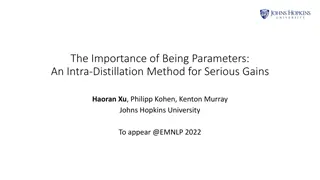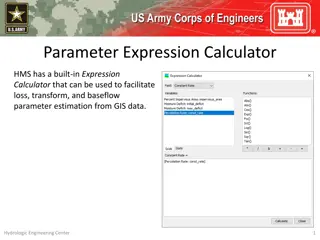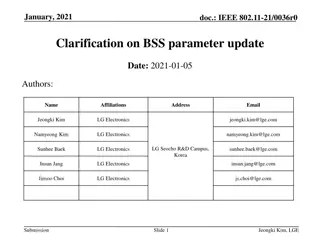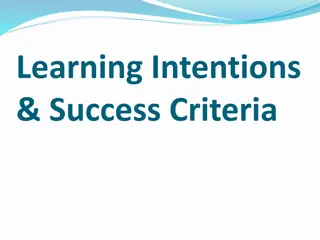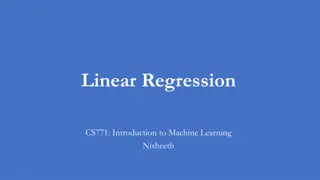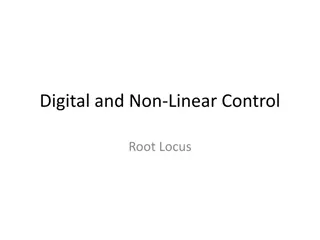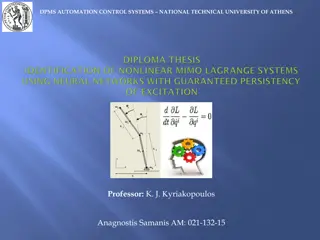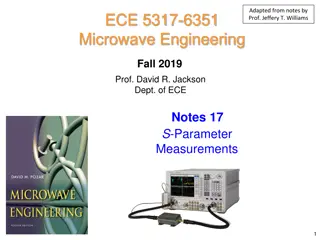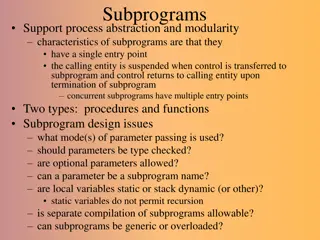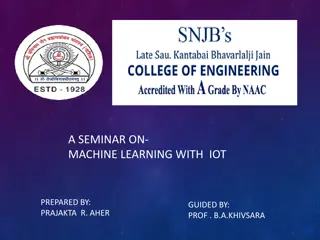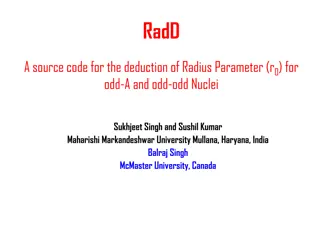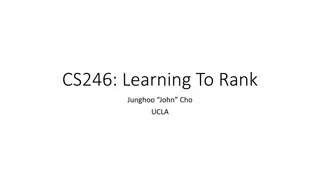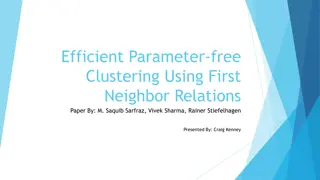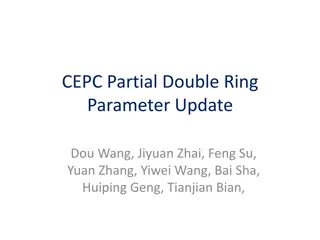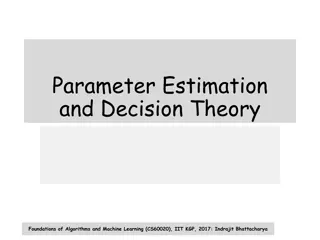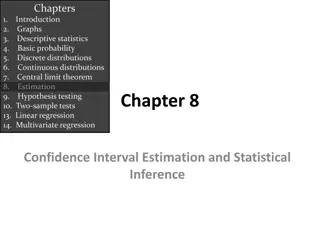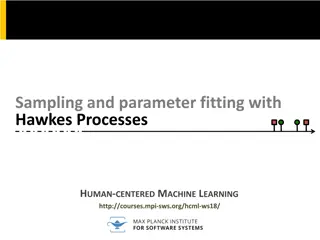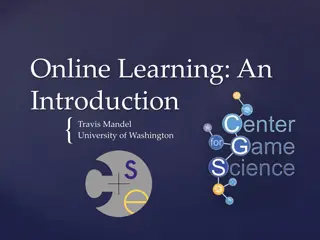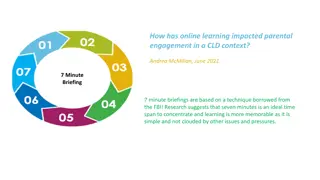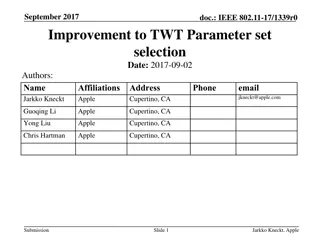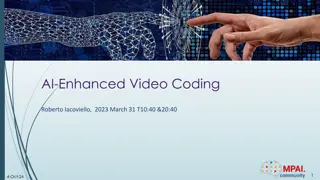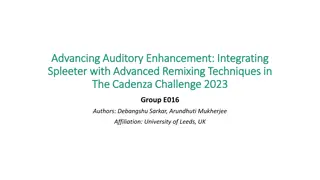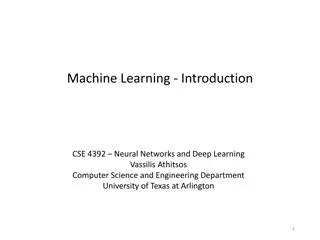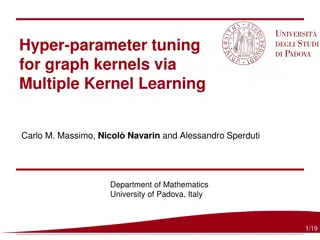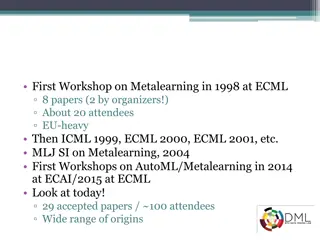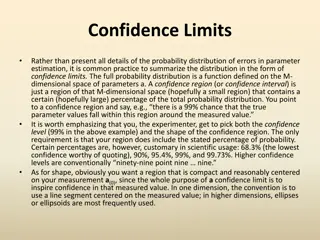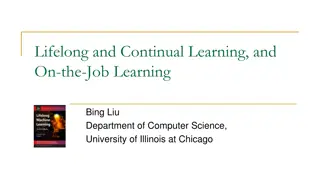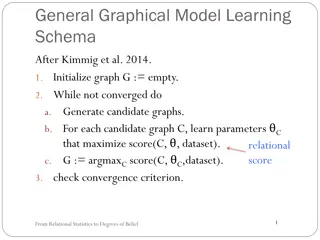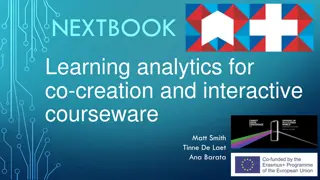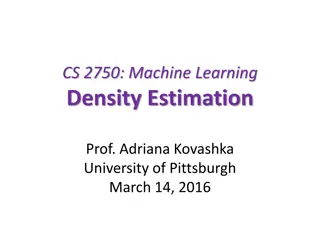Dark Matter Search with ATLAS: Active Learning Application
Explore an active learning application in the search for dark matter using ATLAS PanDA and iDDS. Investigate Beyond Standard Model physics parameters related to Hidden Abelian Higgs Model and New Scalar with a focus on cross-section limit calculations. Understand the process for generating Monte Car
0 views • 16 slides
Intra-Distillation for Parameter Optimization
Explore the concept of parameter contribution in machine learning models and discuss the importance of balancing parameters for optimal performance. Introduce an intra-distillation method to train and utilize potentially redundant parameters effectively. A case study on knowledge distillation illust
8 views • 31 slides
Parameter and Feature Recommendations for NBA-UWB MMS Operations
This document presents recommendations for parameter and feature sets to enhance the NBA-UWB MMS operations, focusing on lowering testing costs and enabling smoother interoperations. Key aspects covered include interference mitigation techniques, coexistence improvements, enhanced ranging capabiliti
3 views • 18 slides
Parameter Expression Calculator for Efficient Parameter Estimation from GIS Data
Parameter Expression Calculator within HEC-HMS offers a convenient tool to estimate loss, transform, and baseflow parameters using GIS data. It includes various options such as Deficit and Constant Loss, Green and Ampt Transform, Mod Clark Transform, Clark Transform, S-Graph, and Linear Reservoir. U
2 views • 5 slides
IEEE 802.11-21/0036r0 BSS Parameter Update Clarification
This document delves into the IEEE 802.11-21/0036r0 standard, specifically focusing on the BSS parameter update procedure within TGbe D0.2. It details how an AP within an AP MLD transmits Change Sequence fields, Critical Update Flags, and other essential elements in Beacon and Probe Response frames.
1 views • 11 slides
Understanding Learning Intentions and Success Criteria
Learning intentions and success criteria play a crucial role in enhancing student focus, motivation, and responsibility for their learning. Research indicates that students benefit greatly from having clear learning objectives and criteria for success. Effective learning intentions should identify w
1 views • 24 slides
Overview of Linear Regression in Machine Learning
Linear regression is a fundamental concept in machine learning where a line or plane is fitted to a set of points to model the input-output relationship. It discusses fitting linear models, transforming inputs for nonlinear relationships, and parameter estimation via calculus. The simplest linear re
0 views • 14 slides
Understanding Root Locus Method in Control Systems
The root locus method in control systems involves tracing the path of roots of the characteristic equation in the s-plane as a system parameter varies. This technique simplifies the analysis of closed-loop stability by plotting the roots for different parameter values. With the root locus method, de
0 views • 41 slides
Experiential Learning Portfolio Program at Barry University
Experiential Learning Portfolio Program at Barry University's School of Professional and Career Education (PACE) offers a unique opportunity to earn college credit for learning gained from work and community service experiences. Through this program, students can showcase their experiential learning
0 views • 16 slides
Development of Learning Techniques in Automation Control Systems
Development of Learning Techniques in Automation Control Systems at the National Technical University of Athens focuses on system identification, parameter approximation, and achieving control goals using statistical methods and mathematical models. Techniques such as open loop form, closed loop for
0 views • 18 slides
Understanding S-Parameter Measurements in Microwave Engineering
S-Parameter measurements in microwave engineering are typically conducted using a Vector Network Analyzer (VNA) to analyze the behavior of devices under test (DUT) at microwave frequencies. These measurements involve the use of error boxes, calibration techniques, and de-embedding processes to extra
0 views • 20 slides
Overview of Subprograms in Software Development
Subprograms in software development provide a means for abstraction and modularity, with characteristics like single entry points, suspension of calling entities, and return of control upon termination. They encompass procedures and functions, raising design considerations such as parameter passing
4 views • 25 slides
Seminar on Machine Learning with IoT Explained
Explore the intersection of Machine Learning and Internet of Things (IoT) in this informative seminar. Discover the principles, advantages, and applications of Machine Learning algorithms in the context of IoT technology. Learn about the evolution of Machine Learning, the concept of Internet of Thin
0 views • 21 slides
Understanding Gradient Boosting and XGBoost in Decision Trees
Dive into the world of Gradient Boosting and XGBoost techniques with a focus on Decision Trees, their applications, optimization, and training methods. Explore the significance of parameter tuning and training with samples to enhance your machine learning skills. Access resources to deepen your unde
1 views • 9 slides
Innovative Learning Management System - LAMS at Belgrade Metropolitan University
Belgrade Metropolitan University (BMU) utilizes the Learning Activity Management System (LAMS) to enhance the learning process by integrating learning objects with various activities. This system allows for complex learning processes, mixing learning objects with LAMS activities effectively. The pro
4 views • 16 slides
Enhancing Ecological Sustainability through Gamified Machine Learning
Improving human-computer interactions with gamification can help understand ecological sustainability better by parameterizing complex models. Allometric Trophic Network models analyze energy flow and biomass dynamics, but face challenges in parameterization. The Convergence Game in World of Balance
0 views • 12 slides
Code Assignment for Deduction of Radius Parameter (r0) in Odd-A and Odd-Odd Nuclei
This code assignment focuses on deducing the radius parameter (r0) for Odd-A and Odd-Odd nuclei by utilizing even-even radii data from 1998Ak04 input. Developed by Sukhjeet Singh and Balraj Singh, the code utilizes a specific deduction procedure to calculate radius parameters for nuclei falling with
1 views • 12 slides
Learning to Rank in Information Retrieval: Methods and Optimization
In the field of information retrieval, learning to rank involves optimizing ranking functions using various models like VSM, PageRank, and more. Parameter tuning is crucial for optimizing ranking performance, treated as an optimization problem. The ranking process is viewed as a learning problem whe
0 views • 12 slides
Unlocking the Power of Online Learning with Jenifer Grady
Explore the transformative nature of learning through online platforms with insights from Jenifer Grady. Understand the essence of learning, reasons behind learning, accessibility, and the concept of online learning. Discover how learning can be achieved anywhere, anytime, and delve into the world o
0 views • 26 slides
Efficient Parameter-free Clustering Using First Neighbor Relations
Clustering is a fundamental pre-Deep Learning Machine Learning method for grouping similar data points. This paper introduces an innovative parameter-free clustering algorithm that eliminates the need for human-assigned parameters, such as the target number of clusters (K). By leveraging first neigh
0 views • 22 slides
CEPC Partial Double Ring Parameter Update
The CEPC Partial Double Ring Layout features advantages like accommodating more bunches at Z/W energy, reducing AC power with crab waist collision, and unique machine constraints based on given parameters. The provided parameter choices and updates aim to optimize beam-beam effects, emittance growth
0 views • 14 slides
Foundations of Parameter Estimation and Decision Theory in Machine Learning
Explore the foundations of parameter estimation and decision theory in machine learning through topics such as frequentist estimation, properties of estimators, Bayesian parameter estimation, and maximum likelihood estimator. Understand concepts like consistency, bias-variance trade-off, and the Bay
0 views • 15 slides
Understanding Estimation and Statistical Inference in Data Analysis
Statistical inference involves acquiring information and drawing conclusions about populations from samples using estimation and hypothesis testing. Estimation determines population parameter values based on sample statistics, utilizing point and interval estimators. Interval estimates, known as con
0 views • 41 slides
Sampling and Parameter Fitting with Hawkes Processes
Learn about sampling and parameter fitting with Hawkes processes in the context of human-centered machine learning. Understand the importance of fitting parameters and sampling raw data event times. Explore the characteristics and fitting methods of Hawkes processes, along with coding assignments an
0 views • 20 slides
Linear Classifiers and Naive Bayes Models in Text Classification
This informative content covers the concepts of linear classifiers and Naive Bayes models in text classification. It discusses obtaining parameter values, indexing in Bag-of-Words, different algorithms, feature representations, and parameter learning methods in detail.
0 views • 38 slides
Insight into Tuning Check and Parameter Reconstruction Process
Delve into the process of tuning check and parameter reconstruction through a series of informative images depicting old tuning parameters and data sets. Explore how 18 data and 18 MC as well as 18 MC and 12 MC old tuning parameters play a crucial role in optimizing performance and accuracy. Gain va
0 views • 4 slides
Understanding Online Learning in Machine Learning
Explore the world of online learning in machine learning through topics like supervised learning, unsupervised learning, and more. Dive into concepts such as active learning, reinforcement learning, and the challenges of changing data distributions over time.
0 views • 49 slides
Impact of Online Learning on Parental Engagement in CLD Context
The global pandemic in 2020 led to the closure of schools, shifting learning to online platforms. This study explores how online learning has affected parental engagement in Culturally and Linguistically Diverse (CLD) contexts. Family Learning, distinct from homeschooling, plays a crucial role in en
0 views • 11 slides
Enhancement of TWT Parameter Set Selection in September 2017
Submission in September 2017 proposes improvements in TWT parameter selection for IEEE 802.11 networks. It allows TWT requesting STAs to signal repeat times, enhancing transmission reliability and reducing overheads. Non-AP STA challenges and current TWT setup signaling are addressed, providing a me
0 views • 12 slides
AI-Enhanced Video Coding: Advancements and Results
Explore the latest developments in AI-enhanced video coding, including MPAI-EVC Evidence Project, MPEG5-EVC, deep learning enhancements, reference schema, quantization parameter results, super resolution techniques, test combined results, and performance analysis on various sequences. Witness the fu
0 views • 15 slides
Advancing Auditory Enhancement: Integrating Spleeter with Advanced Remixing Techniques in The Cadenza Challenge 2023
Our project for The Cadenza Challenge 2023 focused on improving audio for headphone users with hearing loss by integrating Spleeter's deep learning capabilities. We utilized N-ALR prescriptions, Butterworth bandpass filters, and Dynamic Range Compression to enhance audio quality. By leveraging advan
0 views • 19 slides
Understanding Machine Learning: Types and Examples
Machine learning, as defined by Tom M. Mitchell, involves computers learning and improving from experience with respect to specific tasks and performance measures. There are various types of machine learning, including supervised learning, unsupervised learning, and reinforcement learning. Supervise
0 views • 40 slides
Hyper-Parameter Tuning for Graph Kernels via Multiple Kernel Learning
This research focuses on hyper-parameter tuning for graph kernels using Multiple Kernel Learning, emphasizing the importance of kernel methods in learning on structured data like graphs. It explores techniques applicable to various domains and discusses different graph kernels and their sub-structur
0 views • 20 slides
Exploring Metalearning and Hyper-Parameter Optimization in Machine Learning Research
The evolution of metalearning in the machine learning community is traced from the initial workshop in 1998 to recent developments in hyper-parameter optimization. Challenges in classifier selection and the validity of hyper-parameter optimization claims are discussed, urging the exploration of spec
2 views • 32 slides
Understanding Confidence Limits in Statistical Analysis
Confidence limits are a crucial concept in statistical analysis, representing the upper and lower boundaries of confidence intervals. They provide a range of values around a sample statistic within which the true parameter is expected to lie with a certain probability. By calculating these limits, r
0 views • 4 slides
Understanding Confidence Limits in Parameter Estimation
Confidence limits are commonly used to summarize the probability distribution of errors in parameter estimation. Experimenters choose both the confidence level and shape of the confidence region, with customary percentages like 68.3%, 95.4%, and 99%. Ellipses or ellipsoids are often used in higher d
0 views • 16 slides
Lifelong and Continual Learning in Machine Learning
Classic machine learning has limitations such as isolated single-task learning and closed-world assumptions. Lifelong machine learning aims to overcome these limitations by enabling models to continuously learn and adapt to new data. This is crucial for dynamic environments like chatbots and self-dr
0 views • 32 slides
Learning Bayesian Network Models from Complex Relational Data
Delve into the process of learning Bayesian network models from complex relational data, extending traditional algorithms to suit relational data structures. Explore key concepts like likelihood functions, graphical model initialization, and parameter learning for effective model fitting.
0 views • 20 slides
Enhancing Learning Through Co-Created Interactive Courseware and Learning Analytics
Explore the innovative concept of co-creation in interactive courseware and learning analytics to improve student learning outcomes. Discover how students collaborate in a social learning environment, track their progress, and engage in dialogic and constructive pedagogical strategies. Harness the p
0 views • 19 slides
Machine Learning Density Estimation and Bayesian Inference
Delve into the world of machine learning density estimation, parameter estimation, and Bayesian Bernoulli inference. Explore topics such as parametric distributions, binary variables, beta distribution, and more through slides from Professor Adriana Kovashka's lecture at the University of Pittsburgh
0 views • 25 slides

